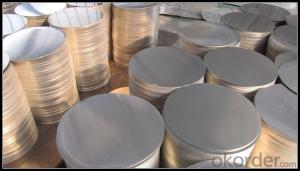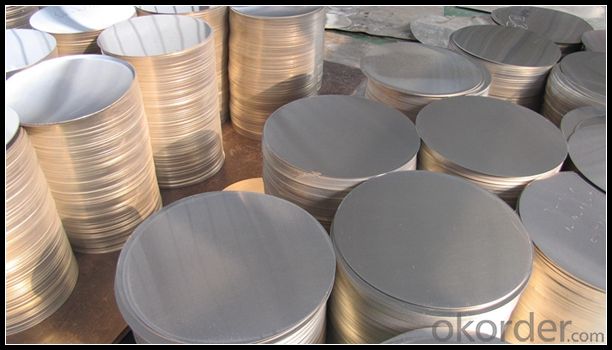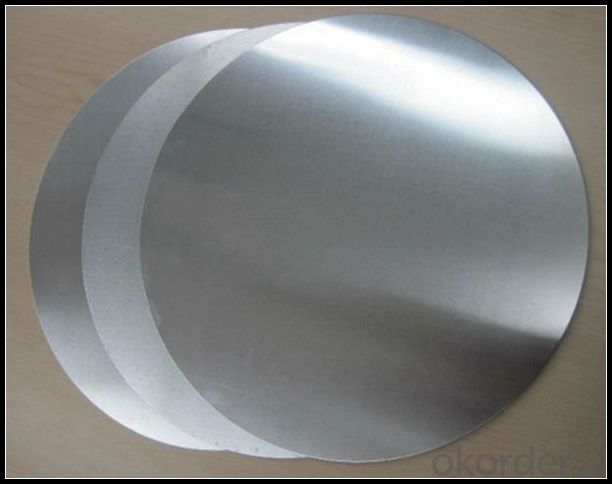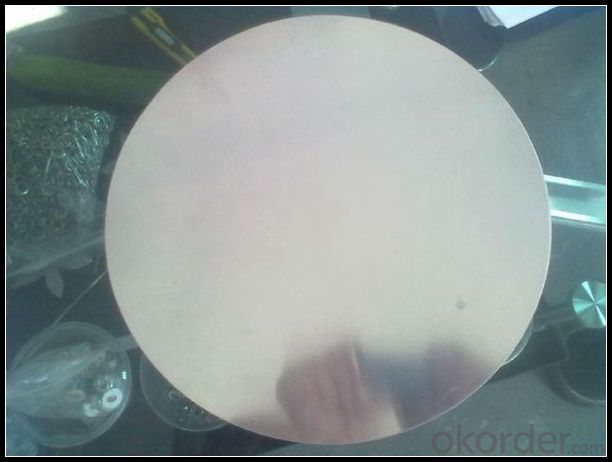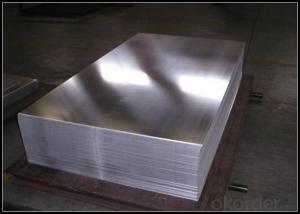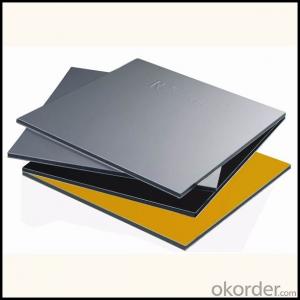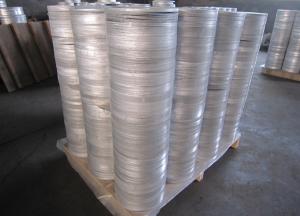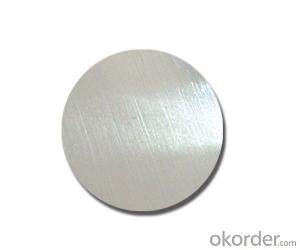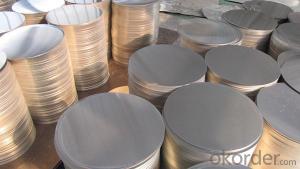Aluminum Sheet Coil Price - Aluminum Circle AA1100 H14 from China Famous Company
- Loading Port:
- Qingdao
- Payment Terms:
- TT OR LC
- Min Order Qty:
- 3 m.t.
- Supply Capability:
- 2000 m.t./month
OKorder Service Pledge
OKorder Financial Service
You Might Also Like
Specification
Thickness | 0.1mm-8mm |
Popular Thickness | 0.1mm/0.2mm/0.25mm/0.3mm/0.6mm/0.8mm/1.0mm/1.2mm/1.5mm/2.0mm/3.0mm |
Width | 20mm-2500mm |
inner diameter | 76mm / 152mm |
Material | AA1050, AA1060, AA1070, AA1100, AA1235, AA3003, AA3004, AA3005, AA5052, AA5005, AA5754, AA5083, AA8011, AA8079, etc |
Temper | O,H12,H14,H16,H18,H22,H24,H26,H32,H34,H36,H38, |
Surface | Mill finish / Coated |
Packing | Export standard wooden pallets |
Payment Terms | 100% irrevocable L/C at sight or 30% T/T in advance as deposit,70% balance against the B/L copy |
Minimum Order Quantity | 5000kg |
Delivery time | 30-35 days after the receiving L/C or deposit |
2. Application of
(1) Interior: wall cladding, ceilings, bathrooms, kitchens and balconies, shutters, doors, windows,
(2) Exterior: wall cladding, facades, roofing, canopies, tunnels,column covers , renovations.
(3).Advertisement: display platforms, signboards, fascia, shop fronts.
3. Feature of
Aluminum sheet specifications:
1) Alloy : 1050 1060 1070 1100 2024 3003 3004 3105 3A21 5005 5052 5083 5754 5182 5454 5456 6061 6063 7075 8011 etc
2) Temper: O/H12/H14/H1/H18/H32/H34/H36/H38//H111/H112/H116/H321/T6/T651/T3/T351 etc
3) Thickness: 0.1mm to 300mm
4) Width:20mm to 3300mm
5)Length: ≤ 12000mm
6) Protective film can be added
7) Production Line: DC and CC production line
4. Certificate:
SGS and ROHS (if clients request, paid by client), MTC (plant provided), Certificate of Origin (FORM A, FORM E, CO), Bureau Veritas (if client request, paid by client), CIQS certificate and so on.
5. Image of Aluminum sheets
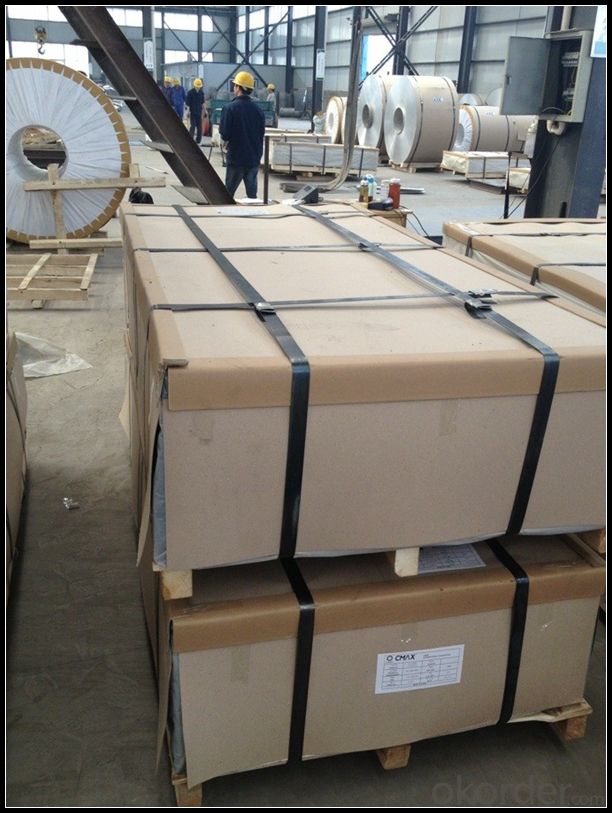
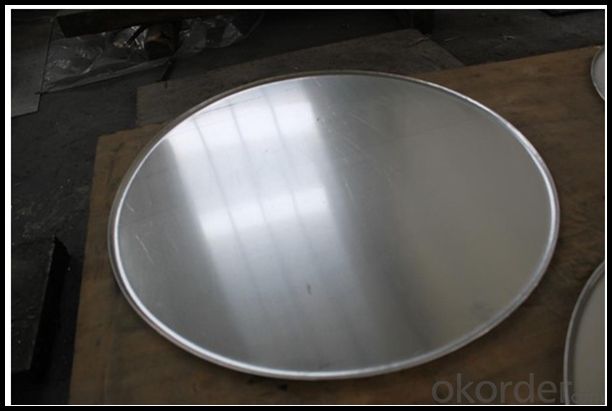
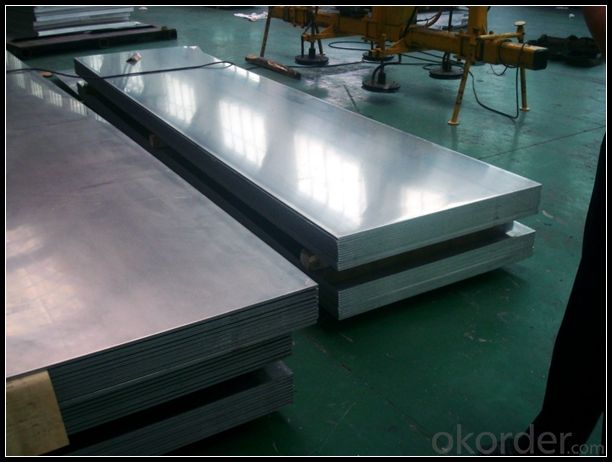
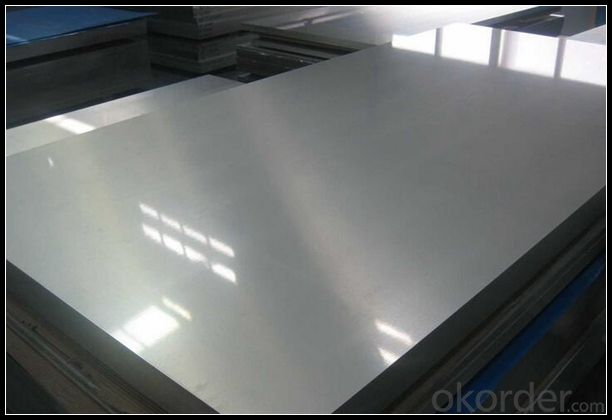
6. Package and shipping of
Eye to wall
Eye to the wall
With wooden pallet (wooden case also available)
7. FAQ
1) What is the delivery time?
Depends on actual order, around 30 to 35 days
2) What is the QC system?
We have QC staff of 20 persons and advanced equipment, each production is with MTC traced from Aluminum ingot lot.
3) What market do you mainly sell to?
Australia, America, Asia, Middle East, Western Europe, Africa etc
- Q: What are the typical lead times for ordering aluminum coils?
- The typical lead times for ordering aluminum coils can vary depending on various factors such as the supplier, quantity ordered, and current market conditions. Generally, lead times can range from a few weeks to several months. For standard or readily available aluminum coil sizes and grades, lead times are usually shorter and can be fulfilled within a few weeks. This is because suppliers often maintain a certain level of inventory for popular products. However, for customized or specialty aluminum coils, lead times tend to be longer. This is because these coils may require specific dimensions, finishes, or alloys that are not readily available. The production process for such coils involves additional steps, such as casting, rolling, and surface treatments, which can extend the lead time. Additionally, market conditions and supplier capacities can also impact lead times. During periods of high demand or when there are supply chain disruptions, lead times for aluminum coils may increase. Conversely, during slower periods or when suppliers have excess capacity, lead times may be shorter. To get an accurate estimate of lead times, it is recommended to contact aluminum coil suppliers directly. They will be able to provide specific information based on their current production schedules and inventory levels.
- Q: How are aluminum coils used in the production of musical instruments?
- Aluminum coils are commonly used in the production of musical instruments, particularly in wind instruments like saxophones and trumpets. These coils are shaped into a specific design and attached to the instrument to create the desired sound. The aluminum material allows for a lightweight and durable construction, enhancing the instrument's playability and resonance.
- Q: What are the legal frameworks or regulations that control the manufacturing and distribution of aluminum coil?
- <p>Yes, there are regulations and laws governing the production and sale of aluminum coil. These often include environmental protection laws that regulate emissions and waste disposal, safety standards for manufacturing processes, and quality control regulations to ensure the product meets certain specifications. Additionally, trade laws and tariffs may affect the sale of aluminum coil, especially when it crosses international borders. Compliance with these regulations is crucial to avoid penalties and maintain a competitive edge in the market.</p>
- Q: This question asks about the impact of aluminum coils on the quality of food when it is stored. It seeks to understand if there are any changes in the food's properties due to the presence of aluminum coils.
- <p>Aluminum coils themselves do not directly affect the quality of food during storage. They are often used in the packaging industry for their excellent barrier properties against light, oxygen, and moisture, which can help preserve the freshness and quality of food by preventing spoilage and oxidation. However, it's important to note that aluminum does not interact with food in a way that alters its taste or nutritional content. Any potential health concerns related to aluminum exposure are more associated with the manufacturing process and not with the storage of food in aluminum-coiled packaging.</p>
- Q: How do aluminum coils contribute to the electrical conductivity of products?
- Aluminum coils are widely used in electrical applications due to their excellent conductivity properties. The electrical conductivity of aluminum is high, making it an ideal material for transmitting and distributing electrical power. When aluminum coils are used in products, they facilitate the flow of electric current. Aluminum has a low resistance to the flow of electricity, allowing for efficient transmission of electrical energy. This low resistance ensures minimal power loss during transmission, which is critical in maintaining the efficiency of electrical systems. Additionally, aluminum coils have a high thermal conductivity, allowing them to quickly dissipate heat generated during the transmission of electrical current. This is crucial in preventing overheating and maintaining the stability and longevity of electrical products. The lightweight nature of aluminum also contributes to its suitability in electrical applications. Its low density makes it easier to handle and install, reducing the overall weight of products and making them more portable. Overall, aluminum coils play a significant role in enhancing the electrical conductivity of products. Their high conductivity, low resistance, and excellent thermal properties make them a preferred choice in a wide range of electrical applications, including power transmission lines, electrical cables, motors, transformers, and other electrical devices.
- Q: What are the potential applications of colored aluminum coils?
- Colored aluminum coils have a wide range of potential applications across various industries. One of the main uses is in the construction sector, where colored coils can be used for both functional and aesthetic purposes. They can be applied as roofing material, siding, or decorative elements on buildings, providing protection against weather conditions while also enhancing the visual appeal of the structure. Another potential application is in the automotive industry, where colored aluminum coils can be used for manufacturing car body panels. The vibrant colors and durability of the material make it an attractive option for creating stylish and long-lasting exteriors for vehicles. Colored aluminum coils also find application in the electronics and electrical industries. They can be used to create casings for electronic devices, such as smartphones, tablets, and laptops, adding a visually appealing touch to these gadgets. Additionally, the lightweight nature of aluminum makes it a suitable choice for heat sinks and other cooling components in electronic devices. In the packaging industry, colored aluminum coils can be utilized for creating eye-catching packaging materials for various products. The vibrant colors and sleek appearance of aluminum can help to enhance the shelf appeal of consumer goods, attracting potential buyers. Furthermore, colored aluminum coils can be utilized in the furniture industry for creating modern and stylish furniture pieces. The versatility of aluminum allows for the production of unique designs and shapes, adding a contemporary touch to interior spaces. Lastly, colored aluminum coils can be employed in the signage and advertising industry. They can be used for creating custom signage, billboards, and promotional displays with vibrant and long-lasting colors, making them an effective marketing tool. Overall, the potential applications of colored aluminum coils are vast and diverse, spanning across industries such as construction, automotive, electronics, packaging, furniture, signage, and advertising. The durability, lightweight nature, and aesthetic appeal of colored aluminum coils make them a versatile material for a wide range of purposes.
- Q: What are the environmental benefits of using aluminum coils?
- There are several environmental benefits of using aluminum coils. Firstly, aluminum is a highly sustainable material. It is one of the most abundant elements on Earth and can be easily extracted from bauxite ore. Unlike other metals, aluminum can be recycled indefinitely without losing its physical properties. This means that using aluminum coils helps reduce the demand for extracting new resources and minimizes the environmental impact of mining activities. Secondly, aluminum is lightweight, which makes it more energy-efficient during transportation. Its low weight reduces fuel consumption and greenhouse gas emissions associated with shipping and logistics. Additionally, aluminum coils can be easily formed and shaped, which allows for efficient packaging and reduces the need for excess materials. Furthermore, aluminum has excellent thermal conductivity properties. This means that aluminum coils can efficiently transfer heat, resulting in more energy-efficient heating and cooling systems. By using aluminum coils in HVAC systems or heat exchangers, energy consumption can be reduced, leading to lower carbon dioxide emissions and a smaller carbon footprint. Additionally, aluminum is highly resistant to corrosion and can withstand harsh weather conditions. This durability ensures a longer lifespan for aluminum coils, reducing the need for frequent replacements and minimizing waste generation. Lastly, aluminum is non-toxic and poses no threat to human health or the environment. It does not release harmful substances or pollutants during its production or use. This makes aluminum coils a safe and environmentally-friendly choice for various applications. In summary, the environmental benefits of using aluminum coils include its sustainability, recyclability, lightweight nature, energy efficiency, durability, and non-toxicity. By opting for aluminum coils, we can contribute to resource conservation, energy savings, and a healthier planet.
- Q: This question asks for the method to measure the dimensions of an aluminum coil.
- <p>To measure the size of an aluminum coil, you'll need to measure its diameter, width, and thickness. Use a tape measure or a caliper to measure the coil's diameter and width. For the thickness, a micrometer or a coil thickness gauge can be used. Ensure the coil is laid flat and measure at several points to get an average thickness. If the coil is wound, you may need to unroll it partially to take accurate measurements. Always follow the manufacturer's guidelines for your specific measuring tools to ensure accuracy.</p>
- Q: Are aluminum coils suitable for outdoor applications?
- Yes, aluminum coils are suitable for outdoor applications. Aluminum is known for its excellent corrosion resistance, making it a popular choice for outdoor use. It is not prone to rust or deterioration when exposed to moisture, sunlight, or harsh weather conditions. Additionally, aluminum coils are lightweight, durable, and have a high strength-to-weight ratio, making them ideal for various outdoor applications such as roofing, gutters, air conditioning systems, and outdoor furniture. Moreover, aluminum is a highly recyclable material, making it an environmentally-friendly choice for outdoor projects. Overall, aluminum coils are a reliable and practical option for outdoor applications.
- Q: Can aluminum coils be used in the production of aluminum sunshades?
- Yes, aluminum coils can be used in the production of aluminum sunshades. Aluminum coils are typically used as a starting material in the manufacturing process of aluminum sunshades. These coils are made from high-quality aluminum, which is known for its lightweight and durable properties. The coils are then fabricated and shaped into the desired form for the sunshade, whether it be slats, louvers, or a solid panel. Aluminum is a popular choice for sunshades due to its corrosion resistance and ability to withstand various weather conditions. Additionally, aluminum is easily recyclable, making it an environmentally friendly material for sunshade production. Overall, aluminum coils are an essential component in the production of aluminum sunshades, providing strength, durability, and aesthetic appeal to these shading structures.
Send your message to us
Aluminum Sheet Coil Price - Aluminum Circle AA1100 H14 from China Famous Company
- Loading Port:
- Qingdao
- Payment Terms:
- TT OR LC
- Min Order Qty:
- 3 m.t.
- Supply Capability:
- 2000 m.t./month
OKorder Service Pledge
OKorder Financial Service
Similar products
Hot products
Hot Searches
Related keywords
